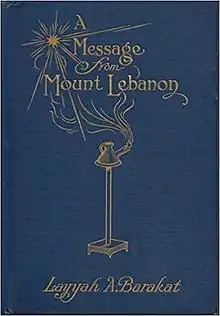Layyah Barakat
Layyah Faris Anton Alkazin Barakat (circa 1858— December 4, 1940) was a Syrian-born Christian missionary, writer, temperance activist, and prison reformer, based after 1882 in Philadelphia, Pennsylvania. She was the first Arab-American woman to write and publish her autobiography, when A Message from Mount Lebanon was published in 1912.
Early life
Layyah Faris Anton Alkazin was born at Abeih near Mount Lebanon (her birthplace is now within the boundaries of Lebanon, but was part of Syria in her time). Her father died in the 1860 Mount Lebanon civil war.[1] She was educated by German missionaries, and at an American girls' school in Beirut.[2]
Career
In Beirut and Cairo, Layya Alkazin Barakat worked with Presbyterian missionaries as a teacher.[3] She escaped the ‘Urabi revolt in 1882[4] and immigrated to the United States that year, with her daughter, her husband, his brother, and other family members.[5]

In the United States Layyah Barakat took an interest in reform work, especially prison reform and temperance. She served on committees of the Pennsylvania Prison Society, touring and inspecting prisons with other concerned men and women.[6] She was a delegate to the fourth world conference of the Woman's Christian Temperance Union in Toronto in 1897.[7] She was "a delightful public speaker... much in demand"[8] for women's church groups, where she was admired for her "sweet face and simple story",[9] but also for her "fervent eloquence".[10]
Layyah Barakat's autobiography, A Message from Mount Lebanon (1912),[11] is believed to be the first autobiography by an Arab-American woman to be published.[12] In 1919 she carried donated food and clothing to Syria.[13] In 1922, a small orphanage for girls in Syria was opened by Protestant missionaries and named after Layyah Barakat, in recognition of her fundraising work. She traveled back to her hometown to attend the opening.[14]
Personal life
Layyah Alkazin married Elias Barakat, a fellow Christian missionary in Egypt; they had three children. Her brother-in-law was Muhanna Eisa Barakat, an ordained Presbyterian minister and lecturer.[5] She was widowed when Elias Barakat died in 1909. Layyah Barakat died in 1940, aged 81 years.[15]
References
- Mrs. S. Brainard Pratt, "May Meeting" Life and Light for Women (August 1884): 300.
- Julia Hauser, German Religious Women in Late Ottoman Beirut: Competing Missions (BRILL 2015): 122. ISBN 9789004290785
- Henry Clay Trumbull, Old Time Student Volunteers: My Memories of Missionaries (Revell Company 1902): 205.
- Linda K. Jacobs, "Playing East: Arabs Play Arabs in Nineteenth Century America" Mashriq & Mahjar 2(2)(2014): 79-110.
- Muhanna Eisa Barakat, A Thrilling Experience of Rev. M.E. Barakat, B.A.: The First and as Yet the Only Minister Preaching in this Country from Damascus (Swedish Publishing Company 1896): 23.
- "Officers of the Society for 1907" The Journal of Prison Discipline and Philanthropy (January 1907).
- Ian Tyrrell, Woman's World/Woman's Empire: The Woman's Christian Temperance Union in International Perspective, 1880-1930 (UNC Press 2014): 46. ISBN 9781469620800
- Louise Seymour Houghton, "The Syrian as an American Citizen" The Survey (October 7, 1911): 964.
- "Woman's Foreign Missionary Society of Friends of Philadelphia" Friends' Review: A Religious, Literary and Miscellaneous Journal (April 21, 1883): 586.
- The Heathen Woman's Friend (July 1886): 1.
- Layyah A. Barakat, A Message from Mount Lebanon (Sunday School Times Company 1912).
- Michael W. Suleiman, "The Arab-American Left" in Paul Buhle, Dan Georgakas, eds., The Immigrant Left in the United States (SUNY Press 1996): 241. ISBN 9780791428832
- "Philadelphia Woman to Aid Syrians" Evening Public Ledger (June 20, 1919): 11. via Newspapers.com

- "To Aid Syrian Tots" Evening Public Ledger (July 3, 1922): 11. via Newspapers.com

- "Mrs. Elias Barakat" New York Times (December 6, 1940): 25.
External links
- A photograph of Layyah Alkazin Barakat as a younger woman, in the Wylie House image collection, Indiana University Libraries, Bloomington.
- A photograph of Layyah Alkazin Barakat later in life, in the Faris and Yamna Naff Arab American Collection, Archives Center, National Museum of American History, Smithsonian Institution.